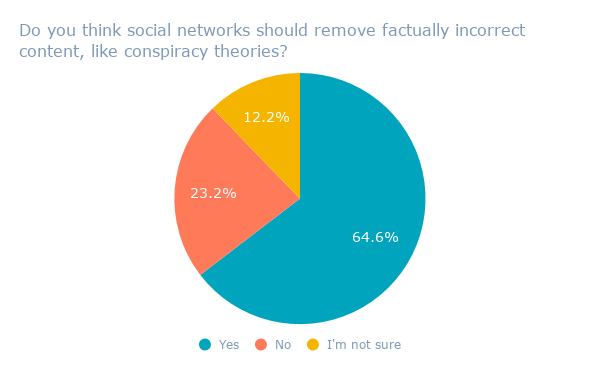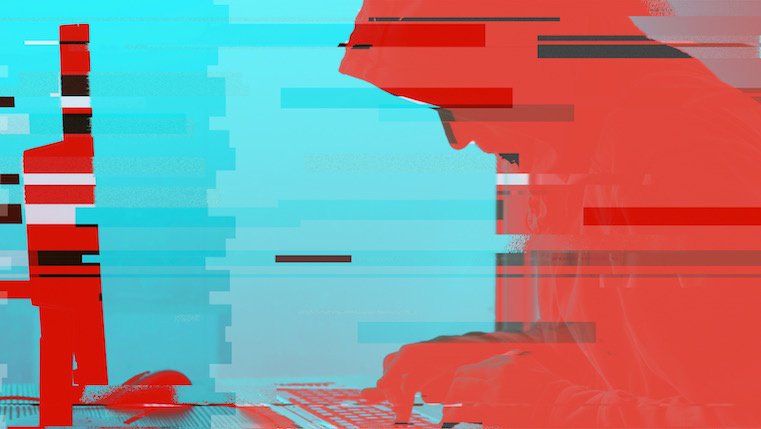Content moderation on social media sites remains a hotly-contested topic. -- these days, there's another big question in the ether. Are social media companies responsible for the content published on their networks -- especially when that content is factually incorrect? But what is the public opinion on the matter -- and to what extent do online audiences believe social media platforms are responsible for the presence of this content on their sites? The Accounts and Users Sharing It Then, we wanted to know how people felt about the moderation of the publishers of that content: the accounts and users distributing it or sharing it on social media. They don't and won't say how many strikes someone like Alex Jones gets before a post or account is taken down. After Facebook later removed several Pages belonging to Jones, the company published a vague explanation of its criteria for removing these Pages. As company executives have explained in the past, Pages and their admins receive a "strike" on every occasion that they publish content in violation of the network's Community Standards. While Facebook, Apple, and YouTube actively removed content from Jones and Infowars -- which is said by some to be far from a sustainable solution -- Twitter has allowed this content to remain on the platform, claiming that it's not in violation of the network's rules. The inconsistent response by various platforms to content from and accounts belonging to Jones and Infowars point to flaws in the development and enforcement of community standards and rules.

Content moderation on social media sites remains a hotly-contested topic.
This year, congressional committees have held not one, but two hearings on the “filtering practices” of social media networks. And while some of these lawmakers begged the question, “Are networks suppressing content from one stream of thought or another?” — these days, there’s another big question in the ether.
Are social media companies responsible for the content published on their networks — especially when that content is factually incorrect?
65% of People Think Social Media Sites Should Remove This Content
The Current Climate
The above question arose at a recent hearingon foreign influence on social media platforms, where Senator Ron Wyden broached the topic of Section 230: a Provision of the 1996 Communication Decency Act that, as the Electronic Frontier Foundation describes it, shields web hosts from “legal claims arising from hosting information written by third parties.”
But those protections are speculated — including by Wyden himself — to be out-of-date, considering the evolution of content distribution channels online, and both the volume and nature of the content being shared on them.
Ron Wyden: “I just want to be clear, as the author of section 230, the days when these [platforms] are considered neutral are over.” cc: all of Silicon Valley
— David McCabe (@dmccabe) August 1, 2018
That includes content pertaining to conspiracy theories, or that is otherwise factually incorrect.
The former has been top-of-mind for many in recent weeks, with the removal of accounts belonging to Alex Jones — a media host and conspiracy theorist who attempts to frame mass shootings and other tragedies as hoaxes — from Facebook, Apple, and YouTube.
But what is the public opinion on the matter — and to what extent do online audiences believe social media platforms are responsible for the presence of this content on their sites?
The Data
We asked 646 internet users across the U.S., UK, and Canada: Do you think social networks should remove factually incorrect content, like conspiracy theories?
On average, 65% of respondents said yes, with the highest segment (67%) based in the UK.

.png?t=1533750343461&width=1800&name=Responses%20by%20Region%20(4).png)
The Accounts and Users Sharing It
Then, we wanted to know how people felt about the moderation of the publishers of that content: the accounts and users distributing it or sharing it on social media.
We asked 647 internet users across the U.S., UK, and Canada: Do you think social networks should remove users or accounts that post factually incorrect content, like conspiracy theories?
On average, 65% of respondents said yes, with the highest segment (68%) based in the U.S.

COMMENTS